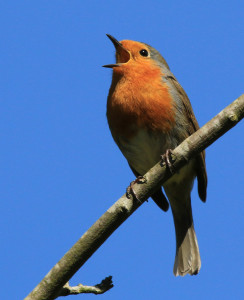Early morning flights are a pain: nobody likes rolling out of bed at the crack of dawn. But if you’ve spent a few bleary-eyed mornings at airports, spare a thought for the local residents. Birds rely on their song to find a mate and keep intruders out of their territory: not an easy task when you’re competing with the roar of a 747 taking off at 290 km/h. Now, research by scientists in Spain and Germany has found that birds living near major airports sing earlier in the morning to avoid being drowned out by aircraft noise.
Researchers from the National Museum of Natural History in Madrid and Freie Universität in Berlin recorded the dawn chorus at sites around 5 major airports. As lead author, Dr. Diego Gil explained, “the idea came one day that I was taking a very early flight and when I arrived at the airport I heard blackbirds singing very early. I thought that perhaps they were trying to get their voices heard before the planes would start flying”. His hunch turned out to be correct.
The team found that many birds such as robins, blackbirds, cuckoos and blue tits that live near airports sing earlier than is normal for their species. Variation in light pollution and daylight length at each site did not affect the tweeting birds so it seems that noise pollution from the airports is the key factor. This shift in the birds’ normal behaviour appears to be an evolutionary response to the pressures of living in an environment dominated by humans. The research was published in Behavioural Ecology.
The birds start singing early in the morning before the airport is active so they are not simply responding to immediate noisy cues. Instead, they appear to have evolved over many generations to adapt their behaviour to deal with the very predictable high noise levels from airports (starting around 6am and increasing throughout the morning). This ties in with previous research which showed that robins are more likely to sing at night in noisy cities and blackbirds start to sing earlier in areas with high traffic noise. With individual planes generating noise four times louder than bird song, it’s easy to understand why birds have opted for a strategy of avoidance rather than competition with their airport neighbours.
Changing their singing behaviour could put energetic stresses on the birds. Whether you consider it a melodious wake-up call or a chattering irritation, the dawn chorus is actually a bragging competition. Birds sing to defend their territories (“keep out this is mine”) or else to attract mates (“I’m big and strong so let’s make babies”). Singing costs both time and energy and must be balanced with the need to go and find food. As Dr. Gil commented, “I would think that singing earlier than what is expected for a given species would modify the energy budget for the birds. Of course, it is possible that there is an optimal solution for this, a kind of plan B, and that birds manage to compensate for it, but it surely brings about a challenge.”
The next step will be to determine the consequences of earlier singing times for birds near airports. The researchers plan to study general activity patterns and feeding behaviour to see if the birds are physiologically affected by their shift in singing times.
So, the next time you grumble about getting up for an early flight, think of your feathered neighbours who have to rise for the early shift each morning to sing their wake up songs and beat the airport rush hour.
Author: Sive Finlay, @SiveFinlay
Image: Wikicommons


